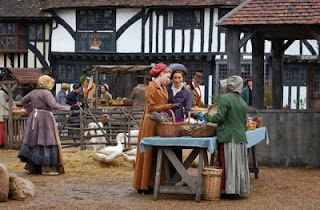Halloween and... our last Pride and Prejudice question

Well, it's Hallowe'en, and apart from the spooky stuff, this is also the night when the barrier between the future and the present is at its thinnest, and you can try and divine who your future life partner will be. At the turn of the 19th century, there were many different traditions to determine this. Here's one of them, from Robert Burns' 1786 poem, Halloween . Jane Austen may well have read this poem, since we know she read Burns' poetry. Burning the nuts is a favorite charm. They name the lad and lass to each particular nut, as they lay them in the fire; and according as they burn quietly together, or start from beside one another, the course and issue of the courtship will be.-R.B. The auld guid-wife's weel-hoordit nits Are round an' round dividend An' mony lad an' lasses' fates Are there that night decided Some kindle couthie side by side And burn the gither trimly; Some start awa wi' saucy pride, An' jump out owre the c









